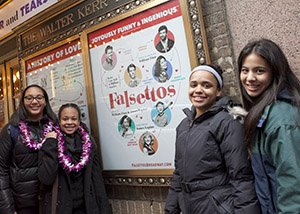For inexperienced actors, student matinees can be a little unsettling. The aliveness of teenagers’ responses can throw off a performer’s timing, forcing adjustments. But at the Wednesday matinee this week of Falsettos, at which 898 students from nine public high schools in New York were present, the degree of rapt attentiveness to the stage was extraordinary. Yes, there was, at first, audible reaction to the hint of physical affection among the characters. But even that reflex had died away by act two. I kept thinking of how a group of students 35 years ago, at the dawn of AIDS, when that second half takes place, might have responded. Quite a bit differently, I suspect. In our current national atmosphere of division and looking backward, it was wonderful for a moment to be reminded how much some attitudes have progressed.
Under the auspices of LCT’s Education Department, the matinee for most students was preceded by three in-class sessions led by Teaching Artists. Those workshops covered such subjects as storytelling, the civil-rights context for the early days of the AIDS crisis, masculinity, cultural rites of passages such as the bar mitzvah, and the dynamics of a loving relationship. A final classroom session is held to debrief everyone on the performance.
Another kind of debriefing took place after the matinee, in which all seven members of the cast fielded questions. Alexandra Lopez, LCT’s Associate Director of Education, kicked things off by asking the students, “Who felt a little bit sniffly” at the sad ending? Dozens of students raised their hands, and the girl sitting next to me cried, “I shook!”
Both Lopez and Kati Koerner, LCT’s Hiltz Director of Education, facilitated the questions. Andrew Rannells, who plays Whizzer, answered a query about the difference between acting for TV and acting for the stage. (Rannells has a big following among the under-25 demographic owing to his role on HBO’s “Girls.”) You do television acting, he explained, “in a bubble.” In live theater, he continued, “We know exactly how you feel.”
Another student asked, “What is the greatest lesson to be learned from this play?” Stephanie J. Block, who portrays Trina, spoke about the need for acceptance and for resilience. When you are brought down by a fractured relationship, she said, “you need to get back up.”
Student matinees always trigger a cascade of questions toward child performers – in this instance, 12-year-old Anthony Rosenthal, who plays Jason. He talked about how his family members support him during the run in multiple ways. He revealed that his older sister, Celia Rosenthal, had stoked his initial interest in musicals. He acknowledged Celia and their mother, Alli Davis, who were standing, during the talkback, at the rear of the theater. His shout-out spurred student cheering.
Rosenthal, who wore a red Star Wars tee-shirt for the talkback, also spoke about his relationship to the six adult cast members. “Every character is a parent to Jason,” he said. He likes to joke, he added, that the musical should not be called Falsettos but rather “Fam-settos.”
**
Participating high schools include:
Flushing High School, High School for Environmental Studies, High School for Law, Advocacy & Community Justice, High School of Fashion Industries, IN-TECH Academy, Marble Hill High School for International Studies, Millennium Art Academy, PACE High School, William E. Grady High School
Brendan Lemon is the editor of lemonwade.com

